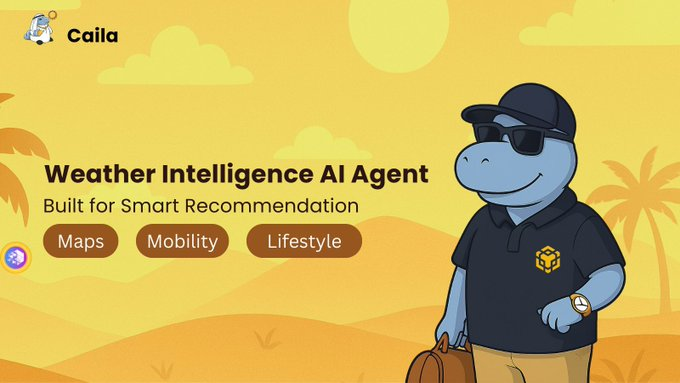CAILA AI Agent: Web3 Paradigm Innovator in the Travel Industry
CAILA AI Agent, developed by Singapore-based CAILA Labs, is a decentralized travel recommendation engine aimed at addressing three major pain points in traditional travel: information overload, lack of personalization, and data value deprivation. Launched in Q3 2024 as a beta version, it has served over 500,000 users with partnerships spanning 2,300 hotels and airlines. On June 5, 2025, its native token $CA will be listed on Binance Alpha, marking the first travel protocol to combine AI Agent technology with on-chain behavior incentives.

This Token Insights article explores how CAILA uses multi-agent collaboration and dynamic NFTs to reshape travel planning, analyzing its token economic model and data privacy compliance challenges.
Technical Architecture: Multi-Agent Collaboration & Data Ownership
Three-Tier Agent System Driving Intelligent Decisions
CAILA’s core innovation lies in its vertically specialized agent clusters:
-
Information Collection Agent aggregates multi-source data (e.g., Instagram posts, payment history, geolocation) with user consent to generate dynamic interest graphs, supporting text, image, and voice inputs.
-
Proposal Generation Agent Cluster consists of 12 specialized agents (e.g., hotel expert agent referencing STRP data, flight agent for real-time comparison), using reinforcement learning to optimize recommendations dynamically. For example, if a user declines a high-priced hotel, the system adjusts budget weighting automatically with a response latency of just 800ms.
-
NFT Itinerary Coordinator transforms completed itineraries into dynamic NFTs that log travel footprints and grant rights (e.g., 3x hotel point redemption). Users may share this data with tourism boards and others to earn $CA tokens.
Blockchain Integration Solving Industry Issues
To tackle data monopolies and commission bias in traditional platforms, CAILA incorporates:
-
Zero-Knowledge Proof (ZKP) Encryption: Sensitive user data is stored on Arweave with only the hash on-chain, complying with the “Travel Big Data Security and Privacy Protection Requirements” for sensitive data like “location history and accommodation info.”
-
Anti-Bribery Mechanism: Merchants must stake $CA tokens for ranking. If negative reviews exceed 15%, the stake is forfeited. All recommendation logic is open-source and verifiable, preventing commission manipulation seen in platforms like Ctrip.
Tokenomics: Four-Dimensional Value Cycle
With a total supply of 1 billion $CA, the project builds a full economic loop:
-
User Incentive Layer: Users earn CA for sustainable behaviors like low-carbon travel (monthly earnings range from 15–$120);
-
Merchant Staking Layer: Hotels/airlines stake tokens to bid for rankings. A negative review rate below 5% grants double returns;
-
Data Trading Layer: Research institutions pay CA for anonymized datasets (average price 200 CA per million entries);
-
Node Ecosystem Layer: Operators providing real-time data share 50% of transaction fees.
Binance Alpha’s first listing round releases 150 million $CA (15% of circulating supply), and Yapybara NFT holders get a 10% airdrop bonus—boosting floor price by 37% within 24 hours.
Industry Transformation: Three Breakthroughs Over Traditional OTAs
-
Efficiency: While traditional platforms take 15 minutes to manually compare options, CAILA’s multi-agent system produces dynamic itineraries in 1.2 seconds, saving users an average of $230.
-
Data Ownership: Unlike OTAs (e.g., Ctrip) that monopolize data value, CAILA’s dynamic NFTs allow users to capture 70% of data sale revenue.
-
Commercial Neutrality: Open-source recommendation logic and staking-slash mechanisms solve commission bias. This model has already benefited the long-tail market—one B&B in Yunnan saw a 470% order increase and a 67% drop in customer acquisition cost.
Challenges & Solutions
Compliance and Technical Bottlenecks
-
Privacy Regulation: EU’s GDPR classifies travel footprints as sensitive. CAILA uses Frankfurt-based proxy nodes for localized storage and separates personal ID fields.
-
Token Inflation: Annual issuance of 12% could cause sell pressure; 50% of fees are allocated for buyback and burn.
-
Computational Cost: The 12-agent system consumes 3.7x more resources than single-agent models. Polygon zkEVM will be used to reduce costs.
Market Competition Pressure
Traditional OTAs (e.g., Ctrip’s “TripChain” project) are experimenting with on-chain revenue-sharing. Web3 competitor BATTLESTAR attracts younger users via gamified designs. Regulatory developments can be tracked via the JuCoin Compliance Center.
Future Development: From Tool to Ecosystem Collaborator
CAILA’s 2025 roadmap targets three main directions:
-
Social Expansion (Q3): Telegram Bot integration to support group travel planning;
-
Sustainable Economy (Q4): Carbon footprint tracking earns 2x CA rewards;
-
RWA Linkage (2026): Itinerary NFTs can serve as on-chain credit credentials for travel loans.
If dynamic NFTs prove successful, tech giants like Apple may accelerate “hardware + agent” integration, steering the travel industry from a transactional model to an experiential collaboration ecosystem.





